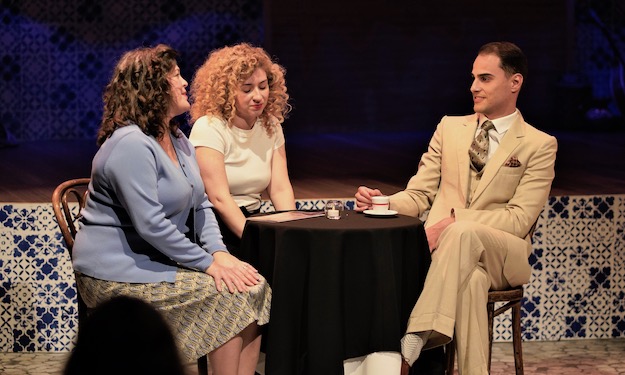
Gotta love the Portuguese tiles in Emma Dickerson’s set. (Photo of Lucia Frangione, Natasha Napoleao, and Pedro M. Siqueira by Jam Hamidi)
Fado: The Saddest Music in the World is an odd title for a play that evokes so little feeling.
The problem is the script.
In playwright Elaine Ávila’s story, a young Portuguese Canadian woman named Luisa travels to Lisbon with her widowed mom, Rosida. Luisa, who wants to study a mournful Portuguese singing style called fado, takes lessons from Antonio, a musician who is an old flame of her mom’s. She meets her estranged cousin Rui. And she finds a beau, a young poet named Tristão.
But the plot and all of its relationships are in the service of an abstract and very deliberate goal: Ávila wants to explore issues of Portuguese history and identity, including emigrant identity. So Antonio lectures both Luisa and Rosida about Portuguese dictator António de Oliveira Salazar, sometimes deconstructing the song lyrics of fado singer Amália Rodriguez, who was a national icon. Rui takes Luisa and her mom to the deceased singer’s home, which is now a museum, and lectures them about the history of fado.
And everybody in the play addresses its concerns head-on. “Do you feel the dreams, the nightmares, the ghosts?” Tristão asks Luisa as they tour an ancient part of the city. Does she feel “the Jews, the Muslims, the slaves” he asks, “all longing for home?”
Everybody in the play keeps talking about the importance of deep feeling, but the play itself is like an illustrated essay: it’s stuck in its head.
And the plot is predictable. Fado is all about heartbreak and Luisa wants to sing fado but has never had her heart broken so, in her relationship with Tristão, you kind of know where things are going.
Fortunately, there’s just enough complexity to keep things moderately interesting. The political Antonio, for instance, admits that he played for the fascists and feels like a coward for it. The best surprise comes from Rui. I’m not talking about his “big secret”: when he shows up immaculately dressed and more or less declares himself the president of the Amália Rodriguez fan club, you know what his revelation is going to be. But this is still the script’s most audacious material and there’s a good surprise later.
And, under the direction of Mercedes Bátiz-Benét, the cast does a remarkable job of warming up the material. Lucia Frangione brings huge heart — and moment-to-moment emotional nuance — to Rosida. Playing Antonio, Judd Palmer feels as authentic as the toothpick that’s always between his teeth. Pedro M. Siqueira makes a svelte and smouldering Rui. And Chris Perrins is charm itself as Tristão.
Natasha Napoleao delivers an appealing humble performance as Luisa and she can sing, which is a good thing, because she’s got to do a lot of it. In a purely singing role, Sara Marreiros also acquits herself well as the ghost of Amália Rodriguez. (The music in this production isn’t spectacular but it’s good enough.)
Even with these strong performances, the end result is still only a moderately engaging evening at the theatre. The script for Fado: The Saddest Music in the World would be so much more affecting if it were less deliberate and more mysterious, more intuitive — more like music.
FADO: THE SADDEST MUSIC IN THE WORLD By Elaine Ávila. Directed by Mercedes Bátiz-Benét. Coproduced by Puente Theatre and the Firehall Arts Centre. At the Firehall on Saturday, November 23. Continues until December 14. Tickets.
NEVER MISS A REVIEW: To get links to my reviews plus the best of international theatre coverage, sign up for FRESH SHEET, my free weekly e-newsletter.
And, if you want to keep independent criticism alive in Vancouver, check out my Patreon page. Newspapers are dying and arts journalism is often the first thing they cut. Fight back!





Interesting review. I found all the performances excellent and moving, but as you say the script was predictable and in that sense disappointing. More nuance would benefit the story. We can be sad and learn from our experiences and move on.
Jeanne